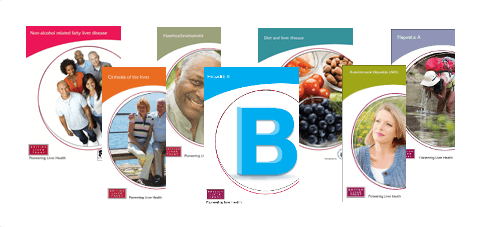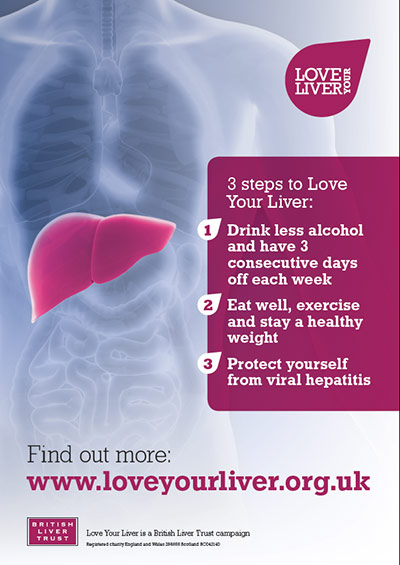Liver disease toolkit
Resources for practices and practice nurses

Patient leaflets on different liver conditions
The British Liver Trust has a full range of leaflets on the whole range of liver diseases that can be downloaded for free. The full range of leaflets can be downloaded from the BLT website, or your patient can order a free hard copy by calling 01425 481320.The most popular leaflets include:
- Living with Liver disease
- Diet and Liver disease
- Alcohol and liver disease
- Non - alcohol related liver disease
- Different types of liver disease
Liver disease often has no symptoms in the early stages. The British Liver Trust has developed a range of materials covering the risk factors for liver disease and the signs and symptoms of liver disease. They are free to order and include posters and leaflets for display in GP surgeries.

- British Liver Trust At risk patient materials
- British Liver Trust online test to see if you are at risk
- NHS Choices symptoms of liver disease in the later stages
Updates and snapshots of interest to nurses:
1. RCN: Caring for people with liver disease: a competence framework for nursing
This framework was developed especially to support all HCPs in identifying patients with known liver disease, identifying those at risk of developing liver disease, promoting health livers and positive lifestyle choices, and to help increase practitioners’ skills and knowledge around managing liver disease. The framework gives examples of what evidence is needed to achieve each area of competence.
For practice nurses, competence 2 gives advice on signposting and supporting patients (and families) to deepen their understanding of their condition through patient education and health promotion.
Community nurses and matrons managing patients with long-term liver conditions may find it useful to use competence 6, working alongside and with the patient (and families), to address the psychological and social impact of their condition. This competence supports appropriate referral to drug and alcohol services, diabetes community teams and coordination of the patient’s care.
Of value to any community practitioner, competence 7.3 looks at managing the pharmacological treatments that may be used in treating patients with liver disease.
2. In order to help understand the needs of community and practice nurses there is an RCN ‘Caring in Practice’ project currently underway (run by Michelle Clayton and Lynda Greenslade).
This project aims to assess the educational needs of community and practice nurses in order to improve their management of patients with liver disease or who are at risk of developing liver disease.
Information will be gathered via a confidential questionnaire which will be available soon on this website. We encourage all practice and community nurses to complete the questionnaire.
Evaluation of responses to the questionnaire will lead onto a study day to address the training needs identified and applying them to the competence framework.
The project will also:
- use social media to deliver bit size chunks of liver learning, relating it to the competence framework
- support nurses in developing skills through practice education sheets
- improve the secondary and primary care pathways for patients with liver disease.
3. The launch of a new liver nursing group called British Liver Nurses Association (BLNA) linked to British Association for the Study of the Liver (BASL) in Sept 2017.
The aims of the BLNA are to:
- one voice for all nurses in primary and secondary care looking after those at risk of or who have liver disease
- work across all four countries in the UK to promote and raise awareness of liver nursing
- work at national and international level to improve the care of patients at risk of or with liver disease
- give a voice to our patients and their families at local and national level to promote equitable access to liver care.
4. Future Plans for developing nursing for those at risk of or with liver disease
- Respond to community and practice nurses’ needs for liver education and support the development of skills needed
- Develop the right educational and support materials and tools for all.
- Use links to the RCN forums to find out what additional support is needed and use those forums to network and share learning and education
- Develop patient-specific care plans for patients as they leave hospital that are available for community services